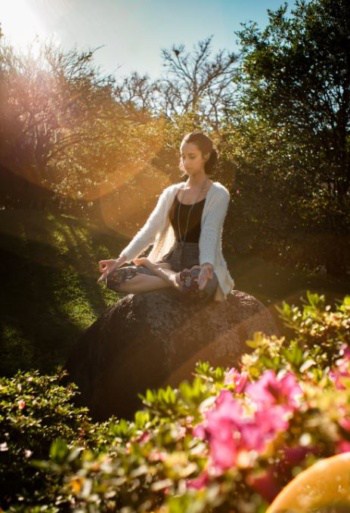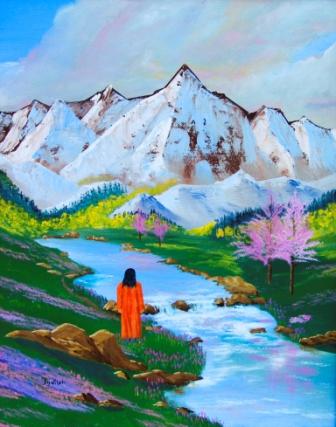Swami Kriyananda once said, “Self-transformation is the first and foremost thing that has to happen…”
Many people wonder, “Is it really possible to change ourselves in a fundamental way? No matter what we do, do we eventually revert to where we started, to our old habit patterns—like the dieter who loses weight and then repeatedly gains all of that weight back again? Overcoming an old habit pattern can seem an impossible task.

When I was in university, I was failing in my studies. I was too restless. I just couldn’t focus. I couldn’t concentrate. One of my friends seemed much calmer and happier than I. She said it was because she meditated. I could imagine that meditation might cure my restlessness. But I felt too restless to even try it. I felt I could never succeed at meditation. This vicious circle continued—until, at a certain point, I realized how unhappy I was. I made a choice—a choice to be happy. I chose a positive direction and stuck with it until I rose above my inertia.
An alcoholic sometimes has to hit bottom, he has to lose everything that has value to him in life. Then he is left with only one choice—the choice to change. The miracle that happens, once we take up a daily spiritual practice, is that we do not need to reach that point of desperation. On their own, through daily meditation, through daily spiritual practice, many of our tastes and habits may fall away of their own accord.
Many times, our meditation students have told us, that with just this daily practice, they no longer have the same desire to smoke, or to drink, or to eat meat—through no effort on their own particularly, just through daily practice. Instead of reacting with uncontrolled anger, they may still feel anger rising in them—but they now feel they have a choice of how to respond. Then, eventually, they no longer even feel that anger. They just feel acceptance for the way things are.

Painting of P. Yogananda by Nayaswami Jyotish
What also accelerates this process is devotion to God, and the subsequent grace of God and Guru that descends to us. Swami Kriyananda has said that before discovering the spiritual path, he tried very, very hard to change himself in various ways, and engaged in self-improvement for several years. He found that once he started meditation, and by attuning himself with his guru, some of the old habits that he had worked for years to overcome fell away quickly, all by themselves. It was through his meditation; it was also through his devotion; and through the grace of God and Guru.
I saw dramatic examples of self-transformation while helping to lead a pilgrimage of thirty Westerners to the places of our gurus and other saints around India. We had a meeting the day the pilgrims arrived, and we had another meeting the day they left.
The pilgrims arrived in Delhi the day after Diwali, often the worst air day of the year—only to return a week later to find the air was even worse. These pilgrims were very self-preoccupied, thinking of their health, and their coughs, and how they could breathe.
By the end of the pilgrimage, their interests were quite different. One pilgrim recounted the deep spiritual experience she had had. Others asked questions: “How can I integrate this inspiration into my daily life? How can I serve others spiritually? How can I make a difference in the world around me?”
Swami Kriyananda once said, “For pilgrimage, two things are necessary: the place, and the pilgrim’s own receptivity.” A lot of people might live in a place of pilgrimage and feel nothing. One needs to be sensitive enough to attune oneself inwardly. Yoganandaji said, “If you go to places where masters have lived, the vibrations there will quicken your realization. The masters’ divine vibrations are still there, just as strong as when they were physically present. Those who are in tune when they go to holy places will feel that presence. But first one has to meditate and prepare oneself.”
It is said that a dip in the Ganga will purify you of all sins. Yoganandaji would jokingly say, “Yes it will purify you—but your sins? As you dip in the Ganga, the sins are sitting in the tree on the riverbank ready to jump on you as soon as you get out.” He is saying that the transformation of pilgrimage can be temporary unless we integrate it into our deeper Self—unless we feel that change inwardly.

A pilgrim hiking under the sun to Mahavatar Babaji’s cave needs to take a sip of water every now and then. Likewise, we must take regular sips of silence, of peace, of joy—always returning to that inner joy. Pilgrimages are one reminder of that joy. For the real pilgrimage, we have to go inside to discover that we are always on an inner pilgrimage. This is the right attitude—the feeling that we are seekers. This is the attitude that will make those changes permanent in our lives. We never were stationary. We are always on pilgrimage, seeking God inwardly, deeper and deeper.
To finish that quote of Swamiji, he said, “Self-transformation is the first and foremost thing that has to happen. But we must also do whatever is in our power to share God’s love and joy with others. These two taken together should be our focus. Deep self-offering to the Guru, and the dynamic sharing of God’s love and joy with other truth-seeking souls.”
4 Comments
A beautiful blog, Keshava. Thanks for sharing!
This is so very very inspiring. Thank you for sharing
Thanks, the knowledge of Sharing is caring
I have been looking for help in changing my Habits, and i was looking for wisdom, this Blog is for me, i feel it.. Jai gurudev, thank you for writing it.